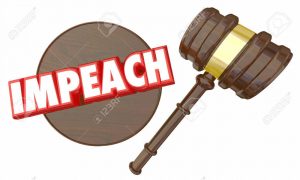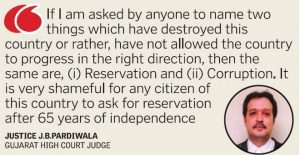Impeachment is the action of questioning the integrity or validity of a high official of a government in a country. Impeachment is the process by which a legislative body formally points charges against a high official of government, it does not necessarily mean removal from office; it is only a formal statement of charges, similar to an outcome in criminal law, and is thus only the first step towards removal. Once an official is impeached, he or she must then face the likelihood of conviction via legislative vote, which then entails the removal of the individual from office.
legislative vote, which then entails the removal of the individual from office.
There are quite a few presidents, prime ministers, judges, senate members, chiefs of states who have been impeached. The two big impeached presidents of USA, Andrew Johnson and Bill Clinton, were convicted by the Senate.
The first female president of Brazil Dilma Vana Roussef was ousted from office in August 2015 after the senate voted overwhelmingly against her on charges of manipulating the federal budget. While Rousseff and her supporters called the impeachment a coup by her political rivals, analysts believe the outcome was inevitable after years of corruption scandals that turned the popular sentiment against the president.
Gautemalan President Otto Perez was accused of architecting a scheme where businesses bribed officials to clear their imports through customs at discounted tariffs. After months of protests in the streets, Perez was stripped of his political immunity and on September 3, 2015, he was presented in court on allegations of customs fraud, racketeering and bribery. Currently, he’s in jail.
Fondly called “Gus Dur”, Wahid restored freedom and democracy to Indonesia after 32 years of dictatorship. He was a champion of human rights and ethnic minorities. However, his eccentricities, frequent cabinet reshuffles and chaotic administration caused his supporters to become disillusioned. Wahid was removed from the presidency in July 2001 under a cloud of corruption allegations, reportedly engineered by his political opponents.
In India, Justice Soumitra Sen of the Calcutta High Court in 2011 avoided the humiliation of becoming the first judge to be impeached by Parliament by tendering his resignation. Justice Sen was found guilty of misappropriating Rs 33.23 lakh under his custody as a court-appointed receiver in the capacity as a lawyer, and misrepresenting facts before a Calcutta court in a 1983 case. Similarly, Justice P.D. Dinakaran, Chief Justice of the Sikkim High Court, against whom the Rajya Sabha Chairman had set up a judicial panel to look into allegations of corruption, resigned in July 2011, before impeachment proceedings could be initiated against him. Corruption, land-grab and abuse of judicial office were among the 16 charges framed against Justice Dinakaran.
Impeachment is serious business and is rarely invoked. It was certainly not called for in case of Justice J.B. Pardiwala in 2015, a group of 58 Rajya Sabha MPs moved an impeachment notice against Justice J.B. Pardiwala of the Gujarat High Court for his “objectionable remarks on the issue of reservation.”The MPs, in their petition, said Justice Pardiwala’s comments on reservation for Scheduled Castes and Scheduled Tribes, while giving a ruling in a case against Patidar leader Hardik Patel, were objectionable. The specific objection seemed to be connected to the observations made by the judge in paragraph 62 of the judgment.
“If I am asked by anyone to name two things which have destroyed this country or rather have not allowed the country to progress in the right direction, then the same is, (i) Reservation and (ii) Corruption. It is very shameful for any citizen of this country to ask for reservation after 65 years of Independence. When our Constitution was framed, it was understood that reservation would remain for a period of 10 years, but unfortunately, it has continued even after 65 years of Independence,” he had said.
Justice Pardiwala is absolutely right: the politicians in India use the master card of reservation to appease the large population by pushing the issue on the front of their agenda. No politician has moral strength and courage to peep into reality and to face it and correct the menace of reservation. The person who spoke openly about it got impeached. This is such a pity. When will our nation wake up from the catnap of reservation? Reservation has divided our country into two parts: non reserved and reserved categories. We all have to Rise against the reservation. It has become a mockery of kind. It has become an obstruction for talent to rise in this country.
The present conspiracy of impeaching the Chief Justice of India – Dipak Misra is to delay and weaken verdicts in two key cases being heard by a Supreme Court bench headed by the CJI. The first is about building a Ram Mandir in Ayodhya. The second is about the death of CBI Judge B.H.Loya. The Congress, Left, NCP and other Opposition parties leading the move for impeachment know they don’t have the two-thirds majority in the Lok Sabha and Rajya Sabha necessary to impeach CJI Misra. Technically, the Chief Justice of India, like the President of India or for that matter any senior Judge, can be impeached under article 124 which gives the legislature the power to act as a watchdog, and a restraining agency, on the Judiciary. But the process is sufficiently complex to ensure that this cannot be done easily. Ever since CJI Misra indicated a few months ago that he would like to fast-track the Ram Mandir-Ayodhya hearings, alarm bells began ringing in the opposition parties. CJI Misra retires on October 2, 2018. He could well deliver the Ayodhya and Loya verdicts before that. The process to impeach him is meant to disrupt both.
A contradictory and impertinent feeling is already set in the minds of people in India and there is strong polarisation among public by the movement of a motion for impeachment of the Chief Justice of India by the Congress-led opposition. While we are talking of progress, self reliance, safety, law and order in India, what are we up to? People have lost faith in the bureaucracy, but faith in the judiciary still prevails. Both these organs of the government assist law and order of our country. The judiciary is still respected and held in a higher esteem. From the early 80s throughout the beginning of the new millennium the judiciary has played a pivotal role in keeping the hopes and aspirations of the people intact. Hope some wisdom prevails in senior politicians of the nation.
Let people not take impeachment so lightly and play with its seriousness, because it’s after effects matter to the larger society and its wellbeing.













































